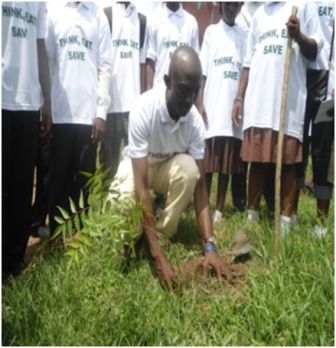Investing in youth in Africa will foster a green agricultural revolution
This week, African leaders and heads of state are gathering in Equatorial Guinea’s capital, Malabo, to discuss the state of affairs in Africa and the role of young people and their contribution to long-term development in Africa. (Photo: Dr Namanga Ngongi, president of the Alliance for a Green Revolution in Africa)
Given the youthful face driving the so-called “Arab Spring,” the focus on young people at the annual summit of Africa’s leaders is both timely and fitting. There are more young people in Africa than ever before—over two-thirds of Africa’s one billion people are under the age of 30.
Despite increased migration to the cities, most of Africa’s young people still live in rural areas. And most of them, whether rural or urban, are unemployed. To build a continent where people can work and live with a degree of prosperity, we must invest more resources in the land — and in the young who live there. Together, these are Africa’s greatest assets.
Seven out of ten Africans earn their living by farming. It is the backbone of most of our economies. The market for African staple foods like maize, milk, meat, banana, sorghum, rice and millet is estimated at over USD$150 billion a year. This market is far larger than the export market for internationally traded African cash crops like coffee, tea, and flowers.
Yet, even at this critical time of high unemployment, farming is not receiving the attention and investment it needs to create and sustain jobs. Agriculture remains a small-scale, rain-fed, low-tech, low-input, and low-output enterprise. For the most part, farming practices haven’t changed in generations. Lack of support to improve productivity and bring innovation into the sector has in many ways pushed our young people away from business opportunities in agriculture and into more attractive sectors like information and communication technology (ICT) or finance. Unemployed youth crowd the over-populated slums that now dominate the social and geographic landscape of our cities.
The on-going ICT and mobile phone revolution occurring across Africa, and the millions of jobs and employment opportunities that opened up as a result of these industries, highlight the transformative role that the continent’s young people can play in the continent’s development. Using some of these technologies, with proper investment and support, our young farmers can also play a transformative part.
As efforts are being made to “re-brand” Africa to other parts of the world, African leaders have an opportunity to “re-brand” agriculture across the continent, particularly for our youth.
To make agriculture attractive to the young, it needs greater resources—for education, for infrastructure, for improving the business environment for agriculture in ways that will raise incomes and expand the agricultural value chain.
The viability of African agriculture relies on the action of people at all levels. But Africa’s leaders should do more to spur private-sector participation in farms of different sizes as well as in agro-processing and support services such as finance and machinery-rental services. It is not tenable that agriculture that employs 70 per cent of Africa’s population, accounts for some 35 per cent of GDP and 40-50 per cent of exports receives barely 2 per cent of commercial bank lending. African governments should do everything possible to provide adequate budgetary resources and put in place financial mechanisms that will mobilize internal resources and direct them to this important sector of the economy.
One key need is investment in higher education—not just for the agricultural sciences, but for training in business, marketing, finance, policymaking and engineering, to create new generations of professionals who can build Africa’s agro-industrial capacity. This should not be limited to the tertiary level but should include a major focus on technical institutes that produce middle level technicians.
We must also invest in transport and ICT infrastructure to enhance the competitiveness of African agriculture and build trade across the continent. At present it is often cheaper to import from faraway continents than neighboring countries. However, non-tariff trade barriers have slowed regional trade within Africa even as the continent imports a growing percentage of its food from the rest of the world. These have to be removed. The feeding of Africa is a huge market opportunity; one that can create millions of badly needed jobs.
African leaders should also start looking at agriculture as a business and farmers as small businessmen (and businesswomen). By creating greater land tenure security and clarifying property rights, especially for women, African countries can encourage smallholder farmers to invest in technologies and practices that enhance the productivity of their land. All this will be possible only if African governments put in place policies and regulations as well as stable policy and macroeconomic environment to improve the business environment for more private sector participation in the agricultural value chain including input supply, medium and large commercial farming, agro-processing and support services such as finance and machinery rental services.
The AU’s Comprehensive African Agricultural Development Program (CAADP) already provides the framework for this new focus. But governments must honor their commitments. Many opportunities have already come and gone.
This week, African leaders have an opportunity to set forth a new vision and plan of action for young people’s involvement in agriculture across the continent. By investing in our own farmers, land, and future, the question will no longer be who benefits, but how to manage those benefits to ensure broad-based economic growth, good jobs, and food security for all Africans.
Sometimes solutions are right before us: the farmers on the ground.
By Namanga Ngongi: Dr Namanga Ngongi is president of the Alliance for a Green Revolution in Africa. www.agra-alliance.org.
Stay with Sierra Express Media, for your trusted place in news!
© 2011, https:. All rights reserved.






